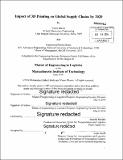Impact of 3D printing on global supply chains by 2020
Author(s)
Bhasin, Varun; Bodla, Muhammad Raheel
DownloadFull printable version (10.74Mb)
Other Contributors
Massachusetts Institute of Technology. Engineering Systems Division.
Advisor
Shardul Phadnis.
Terms of use
Metadata
Show full item recordAbstract
This thesis aims to quantitatively estimate the potential impact of 3D Printing on global supply chains. Industrial adoption of 3D Printing has been increasing gradually from prototyping to manufacturing of low volume customized parts. The need for customized implants like tooth crowns, hearing aids, and orthopedic-replacement parts has made the Life Sciences industry an early adopter of 3D Printing. Demand for low volume spare parts of vintage cars and older models makes 3D Printing very useful in the Automotive industry. Using data collected from expert interviews, site visits, and online sources, and making assumptions where necessary, we developed our model by comparing the current supply chain processes and cost with the future supply chain processes and cost after 3D Printing was adopted. We also developed models to show future trends in 3D Printing adoption and costs. There were several challenges and limitations in this process due to limited availability of primary data, which led us to use secondary sources like the internet and make assumptions. One of the key features of our thesis is that we explicitly state all our assumptions, and present a model that is amenable to what-if analysis. Our analyses suggest that 3D Printing will change future supply chains significantly as production will move from make-to-stock in offshore/low-cost locations to make-on-demand closer to the final customer. This will significantly reduce transportation and inventory costs. The model shows that this will be especially true for low volume products. The models also show us the sensitivity analysis around the change in supply chain costs with the projected decrease in the cost and an increase in adoption of 3D Printing. The other major impact will be the reduction in lost sales due to unavailability of products and increase in customer satisfaction with almost 100% product availability. Finally, our analyses also indicate that 3D Printing could change the dynamics of the logistics industry: there may be reduction in the volume of freight business with an opportunity for 3PL companies to provide 3D Printing services in warehouses.
Description
Thesis: M. Eng. in Logistics, Massachusetts Institute of Technology, Engineering Systems Division, 2014. Cataloged from PDF version of thesis. Includes bibliographical references (pages 81-82).
Date issued
2014Department
Massachusetts Institute of Technology. Engineering Systems DivisionPublisher
Massachusetts Institute of Technology
Keywords
Engineering Systems Division.